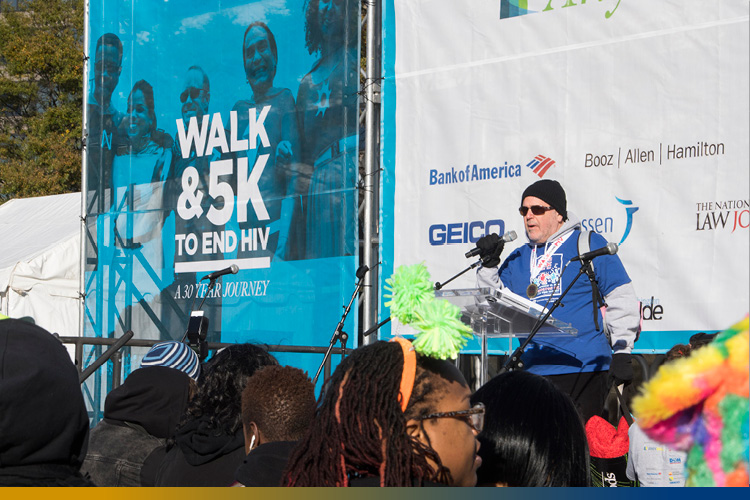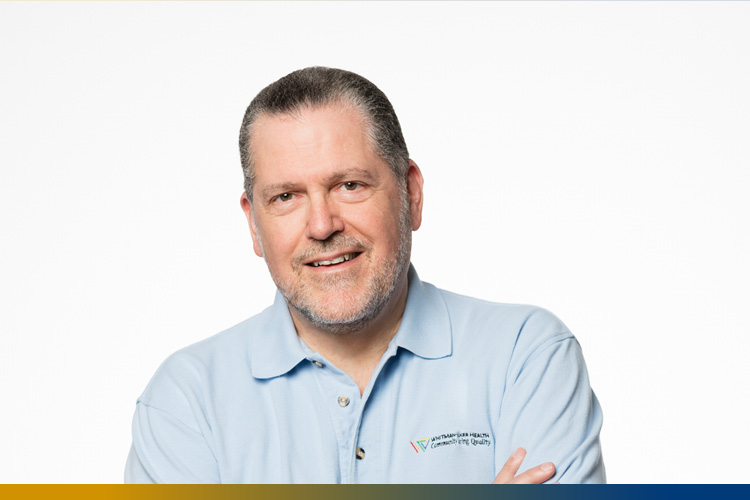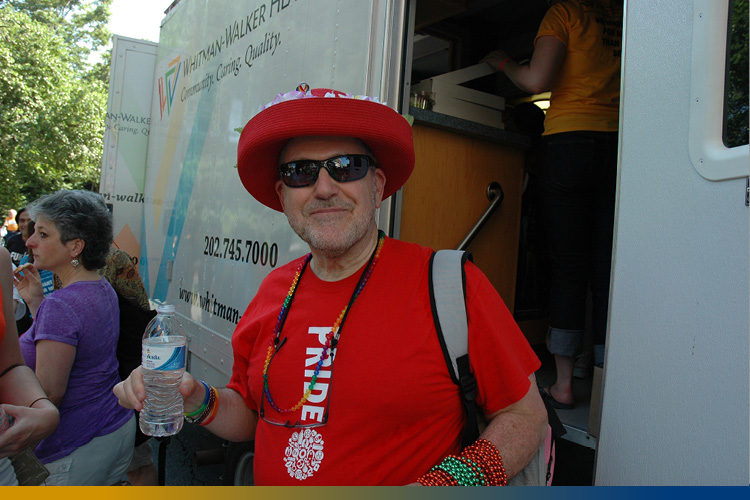As part of Whitman-Walker’s 40th anniversary, officially January 13, 2018, we’re sharing 40 stories to help tell the narrative of the Whitman-Walker community. Please meet Joe Izzo, a 32-year veteran employee at Whitman-Walker Health. Joe was first hired at Whitman-Walker to lead the Sunnye Sherman AIDS Education Project. In this role, Joe coordinated HIV/AIDS prevention and education outreach to high risk populations of male, female and transgender sex workers, intravenous drug users, recently incarcerated individuals and homeless populations. Since August 1991, Joe has served hundreds of clients in Whitman-Walker’s Behavioral Health department as an individual and group psychotherapist. Joe has walked in all 31 Walk & 5K to End HIV events, formerly AIDS Walk Washington, to date.
Click the orange play button below to hear Joe’s 2018 oral history – a recorded interview with an individual having personal knowledge of past events.
Four Quotes from Joe’s Oral History
On Child Abuse, the Catholic Church and Standing up for LGBT & Women’s Rights:
“I just – part of it was I was repressing my own sexuality so much at the time that I just couldn’t do anything like that but I also in the summer of ’69 reported one of the older brothers at a summer camp that I was working at that the brothers ran who was sexually molesting these boys and I had a cabin of 18 11-year-old kids and this one day one of the kids who was a real rough and tumble little boy, and I won’t use his name because this could be public, came to me in tears and fessed up that this brother was sexually molesting him and then told me he was doing it to other guys. So, I shared it with the other brother, there were two brothers to each cabin, and we must have had probably a dozen cabins. So, we had 24 brothers, young brothers that were in seminary at the time taking care of these kids. It was an all-boys camp. So, we decided we needed to report this to the superior. So, the two of us went to the superior and told him what this kid had said, and we checked a couple of other kids and they admit, yeah, this is what’s been happening. Nothing was done. The brother continued, all he told us was, ‘I’ll talk to him.’ The guy stayed at the camp the rest of the summer. He was in charge of the pool. He was in charge of the, the craft shop which was where the sexual behavior was happening; in the, yeah.
So, after the summer, he gets shipped back to the high school that he was teaching math at in Louisville, Kentucky. Now, everyone knew the – nobody but a very few people knew that he was doing this to the kids. Everyone knew he was an alcoholic. He was a severe alcoholic, okay, and he was nasty; at least nasty to his peers. He eventually – he grew old, stayed in the order, and died in the order. He was in his early 80s when he died. Nothing was ever done. So, that’s what came back when I saw Spotlight. You know, here I am, I got excommunicated from the church because I spoke out in favor of women’s ordination and for rights for LGBT folks and so forth. I didn’t molest anybody, ever. Never even thought about it and this guy and God knows how many thousands of priests and so and brothers and so forth who had done that. Very few of them got kicked out. So, that came back and that’s what really kind of caused the PTSD reaction that I had. I couldn’t, I literally could not go to work the next day. I had to, I called my boss at Whitman-Walker and said I, I, I can’t come into work today. I am just too emotionally dysregulated.”

Joe at the Walk & 5K to End HIV, formerly AIDS Walk Washington, on its 30th anniversary in 2016. Joe has walked in every Walk event.
On the First Time HIV Entered His Community:
“… I should have said in October of ’81, just at the same time that this was coming out, I joined a group called the Gay Men’s Counselling Collective which was a peer counseling group that had originally started at Whitman-Walker, but then broke off and was a separate peer counseling group of gay men who wanted to provide services or peer counseling to other gay men and we had some members who were actual psychologists; you know, had degrees in psychology and so forth and it was largely that and my background in pastoral counseling that made me decide that’s what I wanted to do as a career, to become a therapist. So, one of our members had gone away for a week for a work, a work assignment. Came back after that week and had never said to any of us that he was having any kinds of symptoms or anything. He looked fine, right. He came back from this assignment away, wound up in the hospital with pneumonia, and died. And, I mean, that was shocking for us.”

Joe poses for a photo at Whitman-Walker’s We See You campaign photo shoot. Photo by Moshe Zusman.
On the Rapid Impact of HIV in DC:
“That was 1983… and from that point on, from ’83 to ’86, by ’86 there was, I had lost at least a dozen people that I had known who died of AIDS; all young guys, about my age. They were in their late 20s or 30s for the most part. By 1988 that number had upped to three dozen, people that I actually knew personally or close friends, so those years were just devastating, and I started working at Whitman-Walker in June of ’86 and, so, that was just as the whole epidemic was really starting to impact the DC metropolitan area. It had impacted San Francisco, Los Angeles, New York, Houston, Texas, and probably Chicago a little bit before it hit DC but certainly, by the mid-80s we were smack in the middle of the growing epidemic.”

Joe at the 2013 Capital Pride parade.
On the Transition from Curable Venereal Diseases to Incurable HIV/AIDS:
“Well, I think like a lot of gay men at the time before the HIV/AIDS crisis hit, you had to be concerned about other sexually transmitted infections. There was gonorrhea, there was non-specific urethritis, there was syphilis. There were the less infectious things like crabs and scabies and stuff like that; all those sexually transmitted or contact conditions but in those days I knew an awful lot of guys that, you know, they’d get gonorrhea and so forth and they’d just go and get antibiotics and get it cured and I think a lot of them just had a very cavalier attitude about it. Oh, I can, and that was the shock I think about HIV. You can’t take anything and get rid of this because up to that point it was sort of like, oh, I’ll just get an antibiotic. I’ll get a shot, or I’ll take some pills and the STI will be over with. This was a game-changer. Yeah. And, so, we had, that’s when we had to start looking at what does safer sex mean.”


